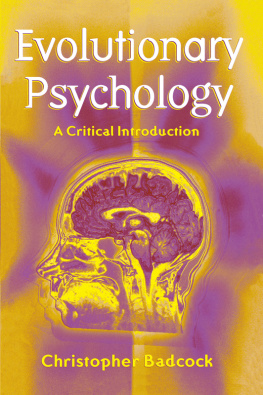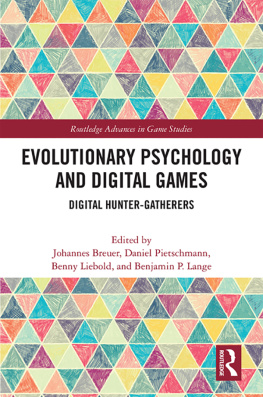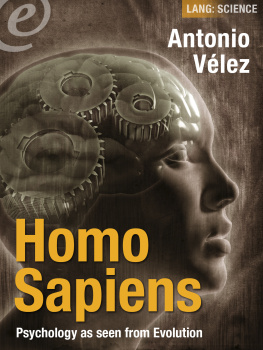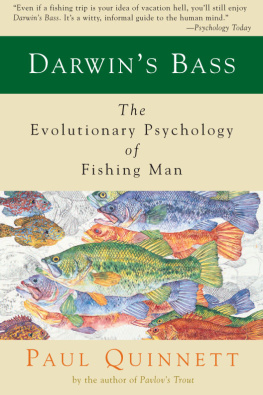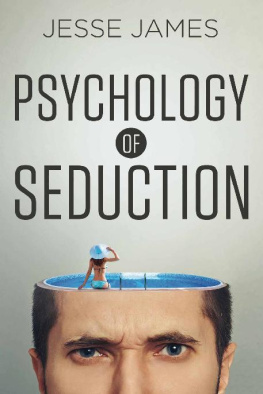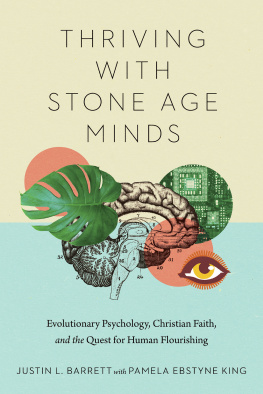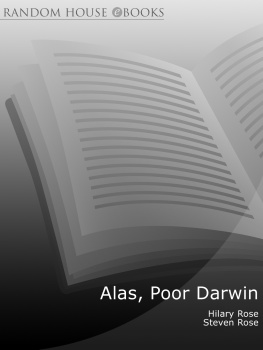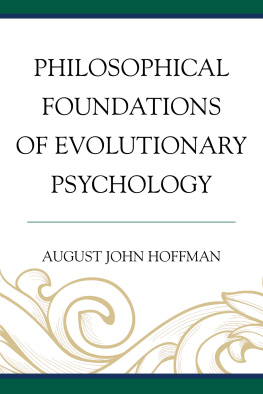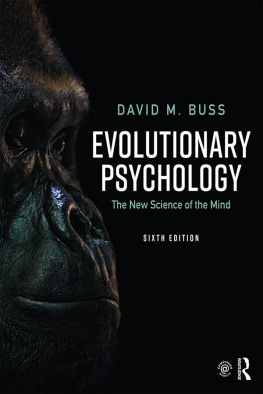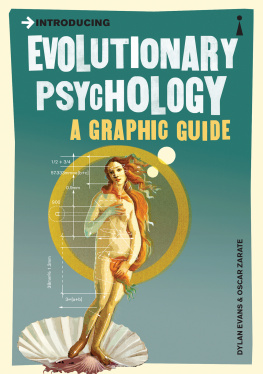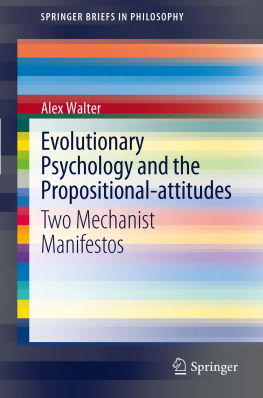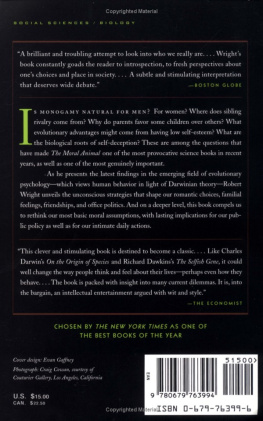Acknowledgements
I have received the help of many different people in writing this book, and would particularly like to thank Peter Abell, Simon Baron-Cohen, Austin Burt, Charles Crawford, Timothy Crippen, Helen Fisher, Derek Freeman, Anthony Giddens, Simon Good, Oliver Goodenough, Valerie Grant, Edward Hagen, David Haig, the late William Hamilton, William Irons, Philip Johnson-Laird, Barry Keverne, Joan Kingsley, Joseph Lopreato, Benita Ludin, Robert Martin, David McFarland, Alex Monto, Fraser Muir, Randy Nesse, Kate Rigby, Antonio Santangelo, Rolf Schppi, Jennifer Scott, Bill Shropshire, David Skuse, Joao de Sousa, Dan Sperber, Nigel Stead, Chris Stringer, Peter Sykora, Lili Tarkow-Reinisch, Andy Thompson, Robert Trivers, Eckart and Renate Voland, Andy Wells, George Williams, and Lewis Wolpert. The generous and untiring help of Robert Kruszynski of the Natural History Museum meant that this book is much better referenced and researched than it would have been otherwise. I am also indebted to my son, Louis, for finding some vital references and for drawing some of the figures. I must thank students following my courses at the London School of Economics during the academic year 19989, on whom much of what is here and some of what is not was tested. Finally, I am deeply indebted to Lynn Dunlop and John Thompson of Polity Press for invaluable editorial advice and guidance, and to Ann Bone for help with the preparation of the printed text and figures.
1
Selection and Adaptation
As far as we know, human beings are the only organisms in the universe who have evolved to the point where they are able to enquire about their own evolutionary origins. Today the claim that our bodies are the product of evolution is nothing like as widely contested as it once was. However, the proposition that not merely our anatomy and physiology but our psychology too might also have evolved is much more controversial. This is the subject matter of evolutionary psychology, and it is the aim of this book to introduce and explain the principles of the field to those with little or no existing knowledge of it.
The concept of evolution
Today the word evolution is strongly associated in peoples minds with Charles Darwin (18091882) and his theory of natural selection. Yet Darwin himself only used the word once in the first edition of his Origin of Species (and only then at the very end, where the last word of the book is evolved). In Darwins day, to evolve meant to unfold, roll out or unfurl (Pagel 1998). Darwin himself used the term transmutation or the phrase descent with modification rather than evolution to suggest a slow, gradual change of one thing into another. Understood in the sense of continuous change, you could see evolution as contrasting with revolution, which means sudden, discontinuous change.
However, it was Herbert Spencer (18201903) who was mainly responsible for introducing the term evolution to the English-speaking world. According to Spencer,
Evolution is a change from a less coherent form to a more coherent form. Alike during the evolution of the Solar System, of a planet, of an organism, of a nation, there is progressive aggregation. From the lowest living forms upwards, the degree of development is marked by the degree in which the several parts constitute a co-operative assemblage there are not several kinds of Evolution having certain traits in common, but one Evolution going on everywhere after the same manner. (Spencer 1884)
The antithesis of evolution for Spencer was not revolution, but dissolution. As this quotation shows, Spencer interpreted evolution as a cosmic process of incremental aggregation and integration into increasingly more complex wholes that embraced the entire universe, organic and inorganic, human and social. The culmination of this process at the social level was human society, with the largest, most integrated and complex societies representing its supreme expression. However, science was also a product of the evolutionary imperative to combine knowledge into larger and more integrated units, and here Spencers own work was evidently intended as the culmination of the trend: a general philosophy based on the most general principle of all Evolution.
Darwin took a different view
Despite the widespread assumption that evolution is inevitably progressive, Darwin himself confessed in a letter to a correspondent that After long reflection, I cannot avoid the conviction that no innate tendency to development exists. In The Origin of Species he added, The inhabitants of each successive period in the worlds history have beaten their predecessors in the race for life, and are, insofar, higher in the scale of nature; and this may account for the vague, yet ill-defined sentiment, felt by many palaeontologists, that organization on the whole has progressed (cited by S. J. Gould 1990: 2578).
To see what Darwin meant, suppose that you were standing on the stage of a theatre. Outside there is a large crowd of people wanting to get in to see some spectacle. Seats are allocated on a one-price, first-come, first-served basis, and the doors are opened. What will happen? Obviously, the first to get seats will want them at the front of the stalls, normally the most expensive in a theatre. Once these are filled, boxes and the centre and back stalls will begin to fill, as will the front rows of the dress circle. When stalls, boxes and dress circle are filled, higher circles will be filled, until eventually only the gods the highest seats, most distant from the stage will remain. But are the gods the best seats, and would anyone with a free choice of any seat choose such a seat? Of course not. The gods only got filled because the rest of the theatre was full already.
This suggests an arresting parallel with evolution. The first-comers of organic evolution to the Earth found a completely open environment and filled the easiest and most accessible parts first the equivalent of the stalls in my theatre analogy. These were the first, very simple unicellular organisms, descendants of which bacteria are still found in vast numbers everywhere on Earth. Later comers had to do a little more to survive, so they evolved separate nuclei in their cells, or became multi-cellular the equivalent of those filling the circles in the theatre analogy. Eventually all these environments were filled and it was more likely than before that large, complex, higher organisms would find new ways of exploiting what remained often by preying on organisms lower down the scale. Eventually, and very late in evolution in relation to the beginning, human beings, the highest of all organisms, appeared the gods in my theatre simile.
The point of this analogy is that no one standing on the stage and watching such a theatre fill would make the mistake of thinking that higher seats were necessarily better than lower ones. On the contrary, the evidence of their eyes would suggest the opposite: that it was the lower seats in the theatre, those nearer the stage, that were filled first, and the higher ones including ultimately the gods were only filled after all the lower ones were taken.
An objective view of organic evolution on Earth would take a similar view. Life evolved into increasingly complex and elaborated forms only because simpler and more fundamental ones had evolved first and had already colonized most of the available environments for such organisms, leaving newcomers to find new, more advanced and usually more complicated ways of existing. There is no reason to presume that there is some universal law of progressive evolution apart from this as envisaged by Spencer or at least, no reason to think so if the mechanism that drives evolution is the one discovered by Darwin.
Natural selection

